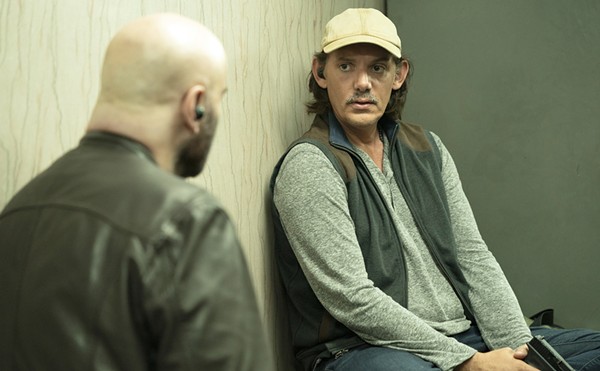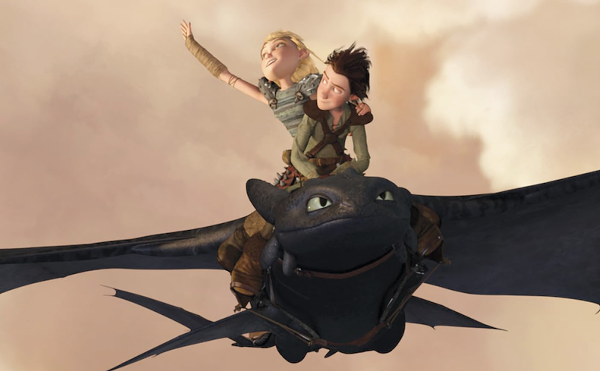Recent Reviews
The Day After Tomorrow, Garfield: the Movie, Harry Potter and the Prisoner of Azkaban, A Slipping Down Life, Spring..., Super Size Me, and all the rest… The Day After Tomorrow
Dir. Roland Emmerich; writ. Emmerich and Jeffrey Nachmanoff; feat. Dennis Quaid, Jake Gyllenhaal, Emmy Rossum, Dash Mihok, Sela Ward, Kenneth Welsh (PG-13)
Certain people out there are going to feel very silly about trying to make a political event out of The Day After Tomorrow - a film which is not only not educational, but could be taught a thing or three (about physics, motivation, and cell-phone reliability) by reasonably smart folks in the audience. As a piece of entertainment, though, the film has an old-fashioned sensibility that (compared to director Roland Emmerich's bloated Independence Day, say) could almost be called modest. Tomorrow has the quasi-scientific moorings of classic '50s sci-fi. Paleoclimatologist Dennis Quaid announces that the end is nigh because, speaking of the salt/freshwater mix that produces oceanic current, "We've hit a critical de-salination point." Long story short, the northern hemisphere is about to be flash-frozen, and Quaid's kid (Gyllenhaal) is on a field trip to NYC. Tomorrow ends not with a plucky action hero, but with Mother Nature deciding she's done enough. Survivors emerge, and Gyllenhaal earns his lady's love. And from its new home south of the border, the White House admits that it was wrong all along about its environmental policy, and that it will do better henceforth. Now that, my friends, is a science-fiction movie. JD
Garfield: The Movie
Dir. Pete Hewitt; Prod. John Davis; Writ. Joel Cohen & Alec Sokolow, based on the comic strip by Jim Davis; feat. Breckin Meyer, Jennifer Love Hewitt, Stephen Tobolowsky; Garfield's voice by Bill Murray (PG)
The 25-year-old comic strip leaps from the funny pages to the big screen in this movie devoted to Garfield, the curmudgeonly, rotund, yet lovable cat who gorges on lasagna, watches bad TV, and sleeps 18 hours a day. Just like many Americans. Jon (Meyer) tries to charm Liz, his former high school crush and veterinarian (Hewitt) by taking in Odie, a stray dog that has been left at the clinic. To Garfield's chagrin, Jon dotes on the new arrival. A jealous Garfield lures and locks Odie out of the house, and as dogs tend to do when allowed to roam without invisible fencing, Odie runs away. During an afternoon of channel surfing, Garfield spots Odie on TV and, realizing that he misses his canine pal, sets off to rescue him. Garfield is the film's only computer-generated character, and he convincingly unlocks cages, reroutes trains, and prompts a prison break from the animal pound. Yet his human emotional qualities teach kids that animals can feel love, grief, jealousy, and pain. As Garfield steps off the curb for the first time to rescue Odie, he announces, "Ladies and gentlemen, Garfield has left the cul-de-sac." In this act of bravery, Garfield realizes that to reap life's rewards, we often have to navigate a hostile world. LS
Harry Potter and the Prisoner of Azkaban
Dir. Alfonso Cuaron; writ. Steve Kloves , based on the novel by J.K. Rowling; feat. Daniel Radcliffe, Rupert Grint, Emma Watson, Robbie Coltrane, Michael Gambon, Richard Griffiths, Gary Oldman, Alan Rickman, Fiona Shaw, Maggie Smith, Timothy Spall, David Thewlis, Emma Thompson, Julie Walters (PG)
Advance rumors that the latest installment in the life of the tremendously popular English boy wizard is terrible are, frankly, unfounded. Harry Potter and the Prisoner of Azkaban indicates that the films, like the books by J.K. Rowling on which they are based, intend to grow with the character and the audience. Potter is in his third year of wizard school now, and yes, I think that might be peach fuzz on his chin. While the script, which involves a dangerous escaped wizard who is alleged to have helped the evil Voldemort kill Harry's parents, feels a little truncated, the books' popularity rest on their deft advice and emotional support for adolescence, with magic and Muggles - the boorish, ordinary humans who refuse to see the wonderful possibility in life - as the allegorical tools. Here Prisoner of Azkaban succeeds tremendously with affecting performances by the three leads, on whom the story focuses. There is plenty of levity, too. Emma Thompson, in particular, who plays the divination teacher, seems to have missed the memo that instructs the august actors who comprise Hogwart's faculty to take the role as seriously as Shakespeare. But then, those of us who live with young teens learn that a little humor is sometimes all that keeps the peace, and the sanity. EW
A Slipping-Down Life
Dir. Toni Kalem; writ. Toni Kalem, based on a novel by Anne Tyler; feat. Lili Taylor, Guy Pearce, John Hawkes, Sara Rue, Irma P. Hall, Tom Bower, Faye-Jean Lindsay (R)
"Ye must be born again," insists a sign on the road in Pulqua, North Carolina. Evie Decker, who lives with her taciturn widower father and works, in a rabbit costume, at a small, unamusing amusement park, seems hardly to have been born the first time around. She becomes obsessed with a local singer-songwriter who calls himself Drumstrings Casey (Pearce). In the women's room of a club where Drumstrings is performing, Evie takes a shard of glass and carves "YESAC" into her forehead. Evie Decker is a natural addition to Lili Taylor's impressive repertoire of characters who are plain, shy, and at least a little bonkers. Precisely because she is unlike any of the groupies who throw themselves at him, Drumstrings falls for Evie. Languorously plotted, A Slipping-Down Life is a study of two characters and one odd romance. The skill with which Taylor and Pearce inhabit their roles compensates for some of the predictable sentimentality of the story. Toni Kalem's film has itself tarried on its way into the larger world. It is a quirky work not likely to be etched in anyone's memory as indelibly as "YESAC" is in Evie's forehead. Yet after four years on the shelf, it deserves to be born again. SGK
Spring, Summer, Fall, Winter ... And Spring (Bom yeoreum gaeul gyeoul geurigo bom)
Writ. & dir. Kim Ki-duk; feat. Oh Young-soo, Kim Ki-duk, Kim Young-min, Seo Jae-kyung, Ha Yeo-jin (R)
Antonio Vivaldi needed only four seasons to represent the cycles of life. But Korean director Kim Ki-duk assembles his film in five sections, repeating spring. Like Zhang Yimou's Raise the Red Lantern, which is also organized according to the seasons, Spring, Summer, Fall, Winter ... And Spring is a highly formalized, tightly framed study of a limited cast of characters within a single setting. A few visitors occasionally intrude from the outside world, but most of the film is confined to a tiny wooden monastery floating in the middle of a tranquil, secluded, sylvan lake. The exquisite color cinematography makes the film seem like a gorgeous travel pitch for rural Korea or a recruitment tape for Buddhist clergy. A viewer is likely not to need a Master to note the symmetries and analogies with which Kim constructs his film. We know what spring brings before it comes again. Primal paradise is an exquisite arcadia inhabited only by two men of disparate ages who have as little need of women as of cable TV. To experience Kim's languourous film is to participate in its rituals of spiritual enlightenment, while accepting its premise that for women the flesh is willing but the spirit is weak. A lovely work to look at, it embodies instruction in forbearance, including tolerance for the merely picturesque. SGK
Super Size Me
Dir. Morgan Spurlock (NR)
In Super Size Me, his first feature film, Director Morgan Spurlock serves as his own guinea pig to test the hypothesis that a steady diet of fast food is hazardous to a consumer's health. By the final frames, a vigorous man in his thirties has become a depressed, exhausted maw, a swollen bundle of human tissue diagnosed as gravely ill. Spurlock resolves that for an entire month he will eat three meals a day at McDonald's. He will order everything on its menu at least once and will opt for the largest portions whenever prompted by an employee. From beginning to end of his dreadful ordeal, Spurlock is monitored by three increasingly appalled physicians and pitied by his vegan girlfriend. Super Size Me is a 96-minute anti-commercial, designed to demonstrate that Big Mac means big trouble. The film also includes conversations with John Banzhaf, the law professor who took on the tobacco industry and now challenges fast-food merchants; David Satcher, former surgeon general of the United States; and Marion Nestlé, a prominent critic of the food industry. The success of fast-food chains is symptomatic of a culture of narcissism, in which nothing is more compelling than individual comfort. After Super Size Me, no one can consider cheeseburgers a comfort food. SGK
Films reviewed by:
GB: Gregg Barrios
JD: John DeFore
LMF: Laura Fries
SGK: Steven G. Kellman
WK: Wendi Kimura
AL: Albert Lopez
JM: Jonathan Marcus
AP: Alejandro Pérez
RP: Rich Perin
LS: Lisa Sorg
JW: Joe Weiss
EW: Elaine Wolff















